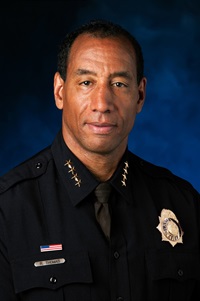By Sara Martin
Ron Thomas, who was recently sworn in as Denver’s new police chief, faces numerous questions as he takes on the mantle of the city’s arm of public safety.
A town hall was recently hosted by Task Force to Reimagine Policing and Public Safety with Chief Thomas to offer a chance for community members to ask questions about the future of the Denver Police Department (DPD) and the practices he envisions.

One of the organizers of the event was Alex Landau, who was assaulted by DPD officers in 2009 and is now a law enforcement reform activist. Two years after the incident, Landau received a $795,000 police-brutality settlement from the city of Denver.
Before the event, the Denver-based taskforce compiled questions to be asked to Thomas. Questions of concern included ongoing excessive force lawsuits from the George Floyd protests in 2020, de-escalation concepts, sexism in the DPD, and officer-involved shooting investigations, which oftentimes find officers did not break the law but occasionally deem they violated the department’s policies.
“I intend to be very steadfast about enforcing violations of policy. If you shoot a moving vehicle, that may not be against the law, but it certainly violates our policy,” Thomas said. “If someone does something else that violates a policy or should be consistent with our commitment to de-escalation, to the decision-making model that we’ve instituted, then certainly I will be inclined to discipline those officers.”
In June, six bystanders were injured after a DPD officer shot at an armed man near a bar in LoDo. The police didn’t tell multiple wounded bystanders that officers were the ones who shot them. A grand jury will decide if the officers broke the law.
According to Thomas, the department has engaged in talks with the University of Denver to create a leadership training academy to enroll groups of officers in.
“It’s going to train them to be better officers today and posture them for leadership positions in the future,” he said. “Lastly, we have incentivized higher education because I understand and believe very strongly that better educated officers are better officers.”
Some people in attendance were not satisfied with Thomas’ answers at the town hall. One woman who came to the mic to ask a question expressed doubt in the chief’s response to handling sexism within the department.
“I am somewhat disappointed in the lack of depth in some of your answers, for one, the issue of sexism within the Denver Police Department,” she said. “This is not a new issue. It’s been going on for years,” she said. “In fact, there is a Black woman sergeant who filed a complaint that is ongoing. To just say that sexism will not be tolerated, doesn’t tell us a plan that doesn’t acknowledge the problem, especially for women of color in the department.”
In September, a 24-year veteran of the department, Sgt. Carla Havard, filed a lawsuit claiming that the agency cultivates a culture of racism, discrimination, and sexism. One goal Thomas said he has is to continue promoting accountability of officers in the field, including with the help of national programs such as Active Bystandership for Law Enforcement, or ABLE.
“We need to make sure that they are well-trained so that they understand where the lines are and then hold them accountable when they crossed the line,” Thomas said in an interview with The Denver North Star. “There’s a couple of things that I think that we have done most recently that I think help hold officers accountable, one is called ABLE, and it’s provided to all officers in the city of Denver.”
The ABLE program launched in 2021 and was developed by the Georgetown University Law Center, which was created in the wake of the death of George Floyd in Minneapolis.
ABLE teaches officers effective ways to step in when they witness misconduct and help agencies build a culture of peer intervention that prevents harm. Serving 33 years in the department and son of former public servants,
Thomas is taking over an agency that has seen struggles with recruitment, shortages of almost 200 officers, heightened violent crime, and safety issues. Thomas was nominated by Denver Mayor Michael Hancock after Paul Pazen announced his retirement as chief after serving four years at the head of the department and with a total of 28 years in the force.

Be the first to comment